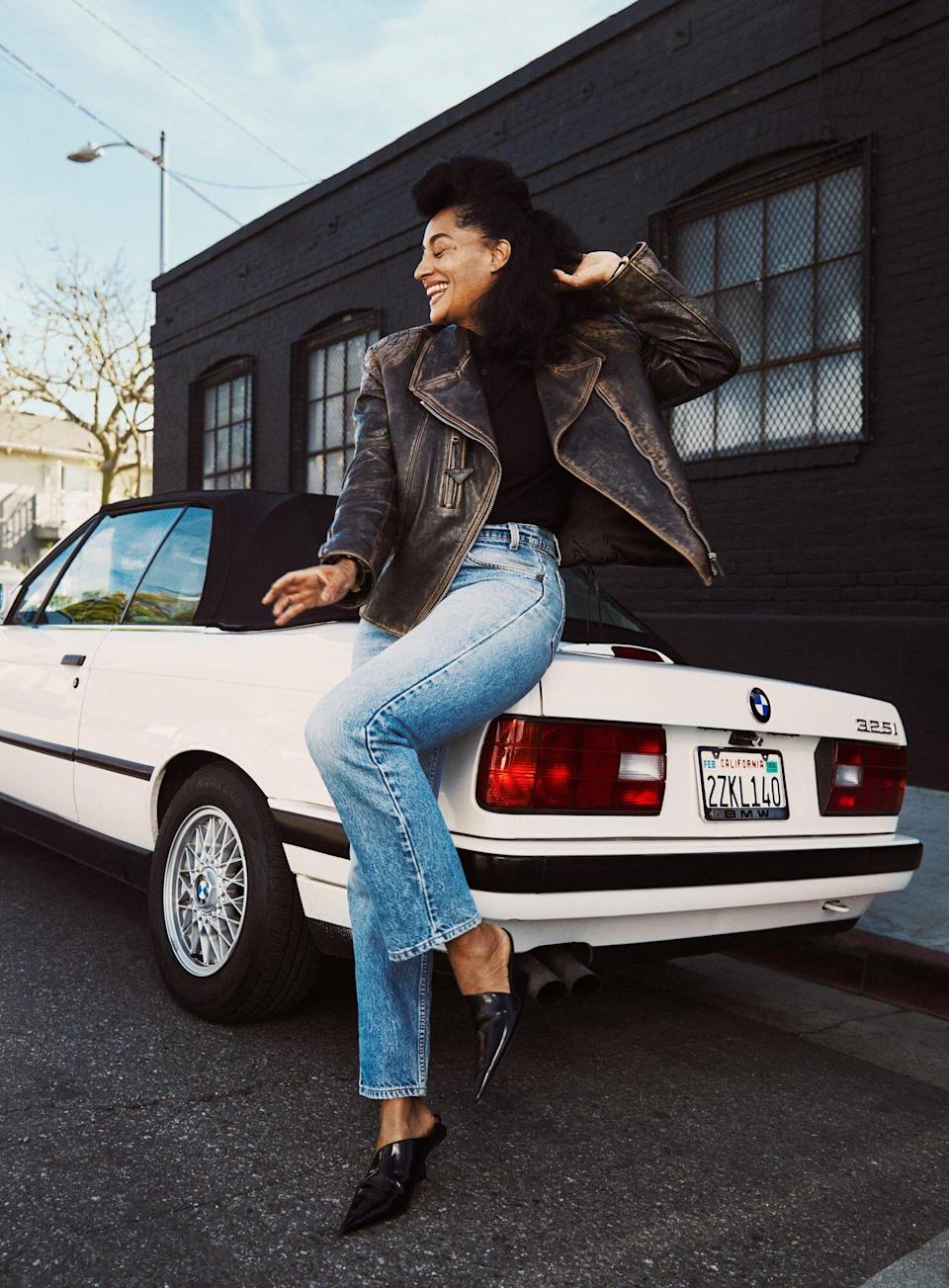
AB+DM/THE ONLY AGENCY Prada jacket, shirt and shoes. Levi’s jeans. Hermes Gold hardware cuffs.
After an eight-season run playing Dr. Rainbow “Bow” Jackson on ABC’s Black-ish, Tracee Ellis Ross has more than earned a months-long vacation to her favorite country — the birthplace of Michelangelo and the actual House of Gucci. But it’s not on her agenda.
“Maybe it would be nice to take a year off or something,” she says when I ask if she has plans for a break now that her work on the show has ended. “But what am I going to do? Just wander around a town in Italy?” She could, but instead she’s piling on more work in front of and behind the camera, running a beauty company, and sitting for interviews like this.


AB+DM/THE ONLY AGENCY Alaia bodysuit, belt and shoes. Vintage Levi’s jeans.
When we connect on Zoom, Ross is at home in L.A., in an emerald-walled room decorated with fresh tulips and gold-framed photos. She is wearing “a really old Jil Sander sweater” she bought at the Barney’s Warehouse Sale and stands up to reveal a pair of brown Chloé trousers. “They’re stolen from Black-ish,” she says of the pants, an addition to her famous wardrobe and a chance to reflect on her time on the show — and the decades of toil she put in before landing it.
Ross was living in New York City working in fashion editorial when she got her first film role in 1996 and she remains the subject of New York Magazine fashion-closet lore to this day. Legend has it she, then an assistant, pointed to a designer gown and said, ‘My mom has this’ — and no one believed her. She hadn’t let them know she was the second-eldest daughter of Diana Ross and music executive Robert Ellis Silberstein.
A move to L.A. and a made-for-TV movie would come before our screens were introduced to Tracee Ellis Ross the comedian, in early 2000 on Lyricist Lounge. “I thought I had died and gone to heaven. I was doing sketch comedy and it was literally like a dream,” she says.
Followed by another dream: “Then I was on Girlfriends, and then I was on Girlfriends, and then I was… yep… on Girlfriends,” Ross says. For most of the aughts, she played attorney Joan Clayton, the stylish and oft unlucky-in-love glue of her friend group. “I felt like I entered that show as a decently talented person who thought she was silly and cute and I became a seasoned, vetted comedic actress after we did 170-some-odd episodes.”
Newer fans may never have seen the show (PSA: All eight seasons are on Netflix), but Ross considers it monumental to both her career and television writ large. “It’s really important to me that it’s recognized mostly because it was a great show,” she says. “It was so representative of who we are as Black women. The fashion was great; the storylines were ahead of the time. People always say, ‘Oh, Black-ish deals with such heavy issues.’ I’m like, so did Girlfriends. We dealt with chlamydia, we dealt with colorism … all those things, and we were four Black women leading a show.”


AB+DM/THE ONLY AGENCY Bottega Veneta shirt, pants and jacket. Isabel Marant shoes.
And then, she wasn’t working on Girlfriends. The show ended abruptly amid the Hollywood writers’ strike in 2008. “There was no wrap party, there was no goodbye, there was no, ‘Oh my God, this was so incredible,'” Ross says. “It was just like — we were gone.”
Despite high ratings and a heightened profile, she found subsequent offers slow to come. “I really thought the pearly gates of Hollywood were going to open,” she says of the months after. “They did not. I thought there would be stacks of scripts at my door. There were not.” And she wanted — and needed — to work. “I had done decently well in terms of my salary, but keep in mind the landscape of television and Hollywood: I was a Black actress on a show that was on UPN and CW. It was a very nice living, but it’s not like I could stop working and be fine for the rest of my life.”
Without representation or new projects on deck, Ross “floundered for a bit,” took some guest roles, and got her first taste of producing on BET’s Reed Between the Lines in 2011. It was an uncertain time and one she calls formative. “I became a woman.”
“I spent a lot of time dreaming of my wedding. I can only imagine how much more I would’ve dreamt of — or how much sooner I would’ve got to some of my dreams — had we been in the conversation that we’re in now.”
—Tracee Ellis Ross
Ross is still in the act of becoming, but pleased with her progress, as she told Laura Brown in a separate interview. “I’m really proud of who I’ve become as a woman that, at 49 years old, I can hold both the grief for what hasn’t happened and also the joy for what is happening. I’m present in my experience with a sense of wholeness I really could not have imagined when I was growing up because I had a lot of discomfort in my skin,” she said. “I actually feel comfortable in my skin now. If you had told me that was going to happen, I don’t know that I would’ve believed you.”
Look no further than Instagram for Ross’s comfortable sense of self. There she is, bikini-clad in a pool, wine glass in hand; deciphering Drake lyrics with Regina Hall and posing in couture; in matching holiday pajamas with her family and cracking jokes while exercising. “It’s my favorite thing,” she says of having access to her 10.8 million followers and vice-versa. Her posts often are literally and figuratively unfiltered, but she doesn’t share everything. “I capture things in my life and every once in a while I have enough courage to post them,” she says. “There’s a treasure trove of things that go to friends that do not go online.”


AB+DM/THE ONLY AGENCY Bottega Veneta shirt and jacket.
For the past eight years, many of our glimpses of Ross have been linked to Black-ish. Her role opposite Anthony Anderson, and alongside Laurence Fishburne, Jenifer Lewis and Yara Shahidi, firmly planted the actress inside those pearly gates she’d been steadily pushing open. During the show’s run, she took home four NAACP Image Awards and earned a Golden Globe in 2017. The show’s comedic depiction of a Black upper class family navigating the everyday mundanities of life amid a real-world socio-political landscape spawned two spinoffs, Grown-ish and Mixed-ish, and drew guest stars like Danny Glover, Mary J. Blige, and Zendaya. In the premiere for the final season, Michelle Obama (whom Ross coyly refers to as a friend) makes a much-buzzed-about cameo. “She’s such a great actress and she was so funny,” Ross says. “She was ad-libbing, and it was amazing.”
While there were “a lot of tears” when production ended, Ross anticipates there being less when the final episode airs on April 19. Unlike with Girlfriends, Black-ish got a proper farewell. “We have the best crew, we have the best cast, and we had a ball,” she says. “I’m so proud of the work we did, and we got an end. The combination of those two things allows me to leave with a lot of joy and pride, and a really full heart.”
When Ross isn’t telling stories onscreen, she’s voraciously consuming them. She lists How We Fight For Our Lives by Saeed Jones, Thick: And Other Essays by Tressie McMillan Cottom, Where the Crawdads Sing by Delia Owens, and Cicely Tyson’s memoir as her recent reads. She watches Atlanta, Insecure, Sex Education and Succession and is a big fan of RuPaul’s Drag Race. When asked who inspires her creatively, Ross says Michaela Coel, without skipping a beat. “Who isn’t inspired by her?”


AB+DM/THE ONLY AGENCY Loewe dress. Derek Lam sunglasses.
In the months to come, Ross is set to roll out a string of new projects currently in production. Among them are Hair Tales, a docuseries exploring Black women through their hair, which Ross is producing alongside Michaela Angela Davis and Oprah; the podcast I Am America, showcasing “stories that prove America is filled with incredible people,” Ross says; and Jodi, a spinoff of ’90s cult animated hit Daria. “And then of course there’s Pattern, which is a full-time job,” Ross says of the haircare line she launched in 2019. “So my deck is full.”
And that means full without an asterisk around her relationship status. “Culturally, young girls are taught to dream of their wedding and not the life they want to be living or the people they want to become,” Ross says, “and I was not spared that messaging as a child — not from my mom or my dad, but from the world that we lived in. I spent a lot of time dreaming of my wedding. I can only imagine how much more I would’ve dreamt of — or how much sooner I would’ve got to some of my dreams — had we been in the conversation that we’re in now, had I had people like myself and others to hear from as different examples of how to cultivate happiness and joy and a life that matches you.”
In establishing such a life, Ross has often looked to the example set by her mother, who managed a wildly successful career while raising five children. “My mom was extremely present,” she says, “waking us up for school, sitting for dinner with us and giving us a genuine, anchored, real family life and home life. The most important thing to my mother was not fame, it was her children.” Ross, too, is content to retreat home when her workday ends. “I’m not necessarily somebody who’s getting hounded by paparazzi because that’s not really a game that I participate in.”
Which doesn’t mean she’s spotlight-averse. “Don’t get me wrong, I love being on camera; one of my favorite things in the world is standing on a stage and being the center of attention; I love all the glamorous clothes and beautiful benefits that come with this.” Another being the accolades that have finally rolled in. “I’m in a job where, when people like what I do, they tell me,” she says. “Not many people get that in their jobs and careers. That validation [is] one part of fame that I think is really beautiful.”
“You can really use clothing in a particular way to say something. It doesn’t just have to be glamour.”
—Tracee Ellis Ross
Recognition frequently finds Ross when she delivers a look, which she does often. The outfits she pulls with longtime stylist Karla Welch, who styled this shoot, can be counted on to quicken the pulse of the fashion press. But Ross told Brown that high pressure red carpet moments send her heart racing, too. The enormous pink Valentino Haute Couture gown that lit up the 2018 Emmys? She said she was “sweating profusely” and searingly anxious in it.
“During the process I’m clear on what I love, and then sometimes I land on that red carpet and I turn into a mess. I’m like, ‘Oh, my God. Everyone’s laughing at me. This is terrible.'” The laughs were likely astonished shrieks at a silhouette no one was wearing at the time but everyone wished they were, as the weeks of glowing press would reveal and years-later copycat colors prove.
Self-doubt aside, Ross has a well-honed sense of style which she says she defined when working in fashion in the ’90s. “There’s a particular taste that came from that period, and Karla and I share it,” she says, adding that the two incessantly text each other looks and bond over commitments to social activism. “That has given us another intersection that really helps our time together, because we understand that you can really use clothing in a particular way to say something. It doesn’t just have to be glamour or it can just be glamour. But I have that choice with her.”
Ross loves to shop, too, and lists Matches Fashion and the Balenciaga and Bottega Veneta boutiques as her go-tos. A recent unsuccessful hunt for a pair of blue The North Face x Gucci overalls led her to an Isabel Marant pair instead. “I just really like clothes, okay? I’ve always been like this. I was the girl that was picking up the beads that came off of my mom’s dress onstage, and I would keep them in little film canisters just to look at them.”


AB+DM/THE ONLY AGENCY Loewe dress. Molly Goddard pants. Custom made leg warmers by Mother Denim. Versace shoes. Derek Lam sunglasses. Vintage belt.
Having forged a friendship with André Leon Talley and walked the Thierry Mugler runway twice with her mother, Ross was one of many deeply saddened by their recent deaths. “Andre and Thierry Mugler were very impactful in my life and my willingness to be courageous in my own style and taste,” she says. “I think it’s heartbreaking. I really do. There’s an era that is leaving us. An era of craftsmanship and expertise and longstanding experience.” She recently went through the text messages she exchanged with Talley, marveling at his use of language. “He made a mark in a world and in an industry where they weren’t looking for him to make a mark. The way he occupied space as a Black person in a world that hunts Black men — he just was a treasure.”
RELATED: Thierry Mugler Is Everywhere You Look
A palpable sorrow blankets the discussion, and Ross acknowledges it’s a feeling she’s spent some time with. “Yesterday I woke up and I had such a good day,” she says, adding that by nighttime she was overcome with unease. “It was absurd. I literally was like, ‘How did I go from the best day ever to having so much anxiety right now?’ If you think of all the brightness and joy that I hold, I have the same on the other side. I deal with — like everybody — disappointment, sadness, bad days, lots of anxiety. I fall back on gratitude, and that’s usually where my attitude changes.”
She’s keenly aware of how much she has to be grateful for. Her career, she says, has given her a platform to live out her mission of “making sure that the world continues to be a safe place — or gets better at being a safe place — where everybody can be themselves freely, particularly with an eye towards Black women and expanding our equity and space in the world.” As a child she dreamed of being “someone very important who wore beautiful things and was in charge of a lot.” Safe to say, she’s done it.
Photographs by AB+DM/The Only Agency. Styling by Karla Welch. Tailoring by Irina Tshartaryan. Hair styling by Marcia Hamilton. Makeup by Molly Greenwald. Manicure by Maho Tanaka. Set Design by Alexa Polanco.
Lead image styling: Prada jacket, shirt and shoes. Levi’s jeans. Hermès gold cuffs.
For more stories like this, check out our Spring 2022 issue available for digital download now.




